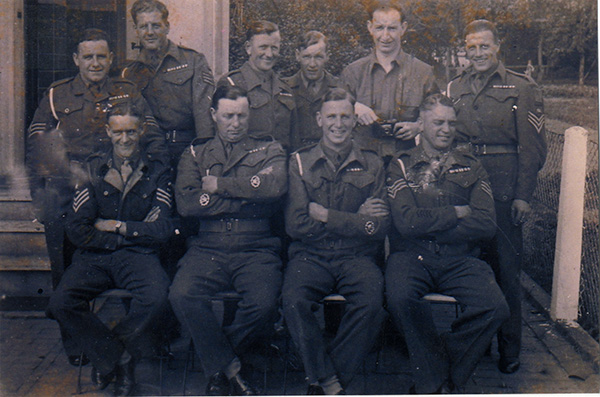This rousing account of the Gordon Highlanders’ war was found in the booklet ’51st Highland Division in North Africa & Sicily’, kindly donated to our archives by Sgt. Walter Stanley Brown. 298th Field Battery R.A., 126th (H) Field Regiment R.A., B.A.O.R. Read on!

The Gordon Highlanders, p28-30
“Keep Rommel on the run- and keep him guessing.”
These were the orders given to a battalion of the Gordon Highlanders with the 51st Highland Division. It was just after the taking of Tripoli. With bad weather, the chase to Mareth had been slowed up, and the Gordons were commissioned to keep the Nazis on the run, and then keep them busy till the rest of the Division could get up.
The Gordons entered into the spirit of the bluff. Having driven the Germans into their prepared positions, they kept them safely there. Every night small companies were out on patrol, their object to make as much noise as they could to scare the wits out of the defenders. So they threw grenades, kicked cans, and generally had an uproarious time.
But it wasn’t always fun. There was one night when Captain Bill Douglas from Banchory was out on a listening patrol. They were practically on top of the Germans, and they had a field telephone with them to keep in touch with headquarters.
Suddenly a shrill ringing cut the stillness of the night. It was the telephone. Someone had forgotten to disconnect the bell. Bill Douglas threw his greatcoat over it; but too late. The alarm had been given. This listening patrol became a fighting patrol.
The Gordons got back safely, but Bill Douglas spent the next day looking for the culprit who had rigged up the telephone!
Still, the bluff came off, and the Division came up without incident.
The Gordon Highlanders, men from Aberdeen and the North East, are tough, hard fighters who are never daunted by difficulties. At Alamein, when one company of Gordons, depleted by casualties, held out grimly against machine-guns, another company got on tanks to go to their aid. “It was like reliving history,” Sergeant George McHollan of Aberdeen told me later. “We felt like the Gordons at Waterloo clinging to the stirrups of the Scots Greys.” And on their steed of steel they got through the minefields to the rescue. It was there, too, that Ewan Frazer from Perth showed how one man could deal with machine-gun posts. With a bodyguard of two men to protect him, he crept near the post, threw in a grenade, and followed with a blood-curling shriek. The Nazis were too dazed to withstand such tactics, and three fully manned posts fell to one man.
It was the Gordons who took up the chase to Agedabia on the Gulf of Sirte and for days put the bluff on Rommel until the Division made their way across the desert.
And it was the Gordons who broke the German line at Misurata and opened the seven-day chase which was to take us into Tripoli. In the early hours of January 23rd, when the first tanks rumbled into the streets of Tripoli, there were Gordons clinging to them. The trembling Italian citizens heard the stirring strains of the “Cock of the North” as the knell of fascist doom, and Pte. Tommy Coutts of Aberdeen and his mates had a “brew-up” in the main square. Two Gordons sent the Union Jack fluttering over the statue of Romulus and Remus- Sergeant Grant of Holytown and Pte. Willie Clark of Wishaw.
And among the first to set their feet on the soil of Europe were men of the Gordon Highlanders. They felled fascist opposition in a few scuffles near the beach, and marched day and night to meet the Germans in Sicily. Vizzini was the first real halt, and it was there that Captain Harry Gordon and his men scaled the cliffs to enter the castle and drive the Nazis from that part of the town. But it was at Sferro that the Gordons came to grips with the desperate Germans. Smashing through to Sferro village, they withstood the most intense bombardment from the neighbouring hills, lived against tank and infantry counter-attacks, and then, when the Nazis broke, took up the chase to Messina which drove the Nazis from the island.
But if the Gordons dealt mercilessly with the tyrants they were looked on as deliverers by the victims of Nazi and Fascist domination. Many an Arab or Jewish kiddie, many a Sicilian mother, had their first decent meal out of a Gordon’s mess tin. It was a Gordon medical aid post that set up a clinic for the poor people of Tripoli, it was Gordons who fed people dying from starvation in the villages on the slopes of Mount Etna. And in one Sicilian district Dr Ranald Dewar from Aberdeen walked six miles up a hillside to help a young mother give birth to her baby in a cave.
“You’re nae a solider if you’re nae a Gordon,” runs the old saw. The Gordons in the Highland Division have proved they are soldiers- and more than just soldiers.
Why not delve into our ‘historic documents’ library and read some of the interesting war diaries that we get sent – there’s nothing quite like reading a personal account of war, as history unfolds itself through the eyes of somebody who was actually there.
Read the rest of ‘51st Highland Division in North Africa & Sicily’ for free here: 51st Highland Division In North Africa and Sicily


